AddingUMIACSCertificateAuthority: Difference between revisions
No edit summary |
No edit summary |
||
| Line 2: | Line 2: | ||
When you visit webpages encrypted with SSL, you may be presented with a warning about the site's security certificate not being trusted. These are normally important screens to pay attention to and be suspicious of. However, UMIACS goes to great lengths to maintain a secure environment for our users. We provide a UMIACS CA (certificate authority) that enables your web browser to trust our secure webpages. The following steps explain how to import this certificate based on your preferred web browser. | When you visit webpages encrypted with SSL, you may be presented with a warning about the site's security certificate not being trusted. These are normally important screens to pay attention to and be suspicious of. However, UMIACS goes to great lengths to maintain a secure environment for our users. We provide a UMIACS CA (certificate authority) that enables your web browser to trust our secure webpages. The following steps explain how to import this certificate based on your preferred web browser. | ||
===Firefox (cross-platform)=== | |||
* Visit http://intranet.umiacs.umd.edu | |||
* Scroll to the bottom and click "UMIACS CA Root Certificate (CRT - Most Browsers)". <br />[[Image:UMIACSCA_IE_1.png]]<br />Firefox should open a "Downloading Certificate" dialog box automatically. It may look slightly different than this depending on your operating system:<br />[[Image:UMIACSCA_Firefox_1.png|458px]] | |||
* Check all three boxes indicating that you fully trust this Certificate Authority | |||
* Click ok. | |||
* You may need to restart your browser for the change to take effect. | |||
===Internet Explorer and Google Chrome (Windows)=== | ===Internet Explorer and Google Chrome (Windows)=== | ||
| Line 12: | Line 20: | ||
* Choose "Trusted Root Certification Authorities" and click ok<br />[[Image:UMIACSCA_IE_3.png|644px]] | * Choose "Trusted Root Certification Authorities" and click ok<br />[[Image:UMIACSCA_IE_3.png|644px]] | ||
* Click next and then finished. You should receive a success message similar to the following:<br />[[Image:UMIACSCA_IE_4.png|200px]] | * Click next and then finished. You should receive a success message similar to the following:<br />[[Image:UMIACSCA_IE_4.png|200px]] | ||
* You may need to restart your browser for the change to take effect. | * You may need to restart your browser for the change to take effect. | ||
Revision as of 19:09, 28 July 2010
Introduction
When you visit webpages encrypted with SSL, you may be presented with a warning about the site's security certificate not being trusted. These are normally important screens to pay attention to and be suspicious of. However, UMIACS goes to great lengths to maintain a secure environment for our users. We provide a UMIACS CA (certificate authority) that enables your web browser to trust our secure webpages. The following steps explain how to import this certificate based on your preferred web browser.
Firefox (cross-platform)
- Visit http://intranet.umiacs.umd.edu
- Scroll to the bottom and click "UMIACS CA Root Certificate (CRT - Most Browsers)".
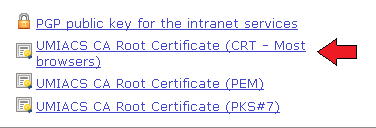
Firefox should open a "Downloading Certificate" dialog box automatically. It may look slightly different than this depending on your operating system: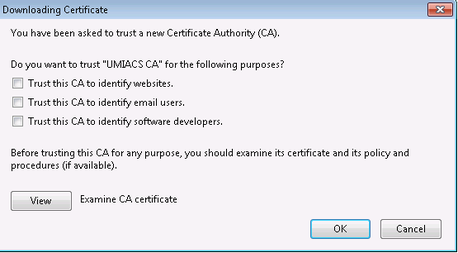
- Check all three boxes indicating that you fully trust this Certificate Authority
- Click ok.
- You may need to restart your browser for the change to take effect.
Internet Explorer and Google Chrome (Windows)
- Visit http://intranet.umiacs.umd.edu
- Scroll to the bottom and click "UMIACS CA Root Certificate (CRT - Most Browsers)". Download and open this file

- Click "Install Certificate..." towards the bottom of the dialog box
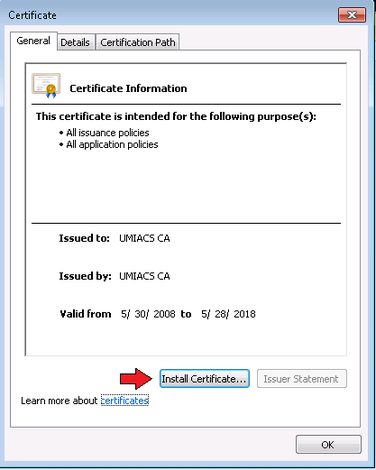
- Click Next
- Choose "Place all certificates in the following store"
- Choose "Trusted Root Certification Authorities" and click ok
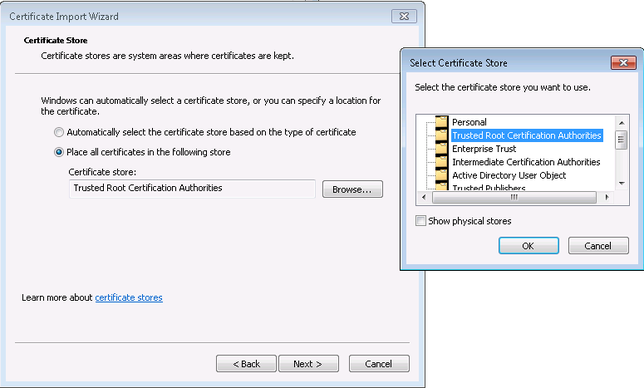
- Click next and then finished. You should receive a success message similar to the following:
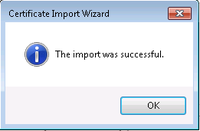
- You may need to restart your browser for the change to take effect.
Safari and Google Chrome (Mac OSX)
- Visit http://intranet.umiacs.umd.edu
- Scroll to the bottom and click "UMIACS CA Root Certificate (CRT - Most Browsers)". Download and open this file by double-clicking it

- Select ok to add the certificate to your keychain:
File:OSX 1.png - The previous step will add the certificate for your own account. However, OSX will preemptively ask if you'd like to add it for the whole system. If you have administrative access on your Mac, choose Always Trust:
File:OSX 2.png - Enter the administrator credentials to add this certificate for all users of the system:
File:OSX 3.png - Close the keychain access window.
- You may need to restart your browser for the change to take effect.
Other Browsers (Linux)
If you are using browser other than Firefox in Linux, the process to accept the certificate authority is more obtuse than the above methods and requires significantly more steps. If you need assistance accepting the certificate for any other browser, please contact UMIACS Staff.